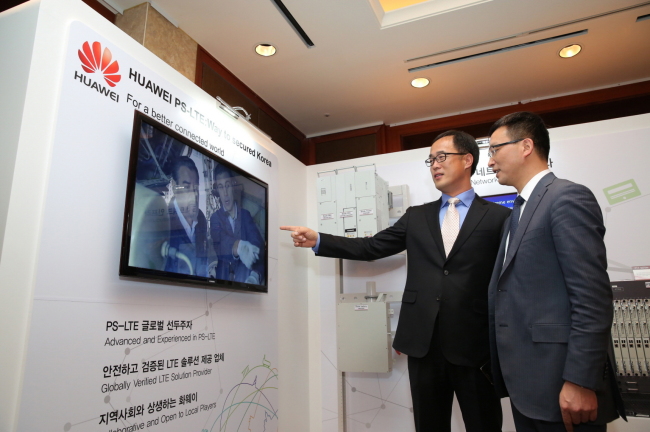Race heats up in bid to build national emergency network
Along with Samsung, potent foreign players like Nokia and Huawei vie for remaining stake
By Korea HeraldPublished : Jan. 28, 2015 - 21:48
A 2 trillion won ($1.84 billion) mega race has commenced as the Korean government plans to launch a new project building a nationwide emergency network based on Long Term Evolution technology ― the first of its kind globally.
Communications breakdowns have often hampered responses to disasters. Experts say that developing communications systems is one of the key challenges in ongoing efforts to improve security preparedness.
The new Public Safety-LTE system will allow fire, police and rescue responders to communicate seamlessly with each other using a standard device that operates on the same frequencies.
While countries like the U.S. and the U.K. plan to adopt the PS-LTE system by 2020, Korea, which aims to complete the adoption by 2017, is considered a test bed for the new technology.
Communications breakdowns have often hampered responses to disasters. Experts say that developing communications systems is one of the key challenges in ongoing efforts to improve security preparedness.
The new Public Safety-LTE system will allow fire, police and rescue responders to communicate seamlessly with each other using a standard device that operates on the same frequencies.
While countries like the U.S. and the U.K. plan to adopt the PS-LTE system by 2020, Korea, which aims to complete the adoption by 2017, is considered a test bed for the new technology.

Within the first quarter of this year, a block of wireless telecommunications airwaves is expected to be auctioned off to one of the nation’s three telecom carriers ― SK Telecom, KT and LG Uplus.
Competition is already heating up among global equipment companies to join the coveted project because securing the first Korean deal will be a boon for their planned business with other countries in the coming years.
Industry watchers say companies will reap a combined 2 trillion won from the network building project alone. Considering the maintenance costs in the next 10 years, the total business size could surge to 3 trillion won.
“Because it is a government-driven project, Korea’s Samsung Electronics is likely to win about half the deal, while other global players will vie for the remaining half,” said an official of a telecom company on condition of anonymity.
In recent months, a slew of global firms, including the two potent competitors China’s Huawei and Finland’s Nokia, are piling into Korea to show off their own competitiveness in the field.
Ericsson-LG, a joint venture between Korea’s LG Electronics and Sweden’s Ericsson, China’s ZTE and France’s Alcatel-Lucent are also eyeing the Korean project. And their intense lobbying has also started.
Huawei, which held a press conference in Seoul on Wednesday, pledged that it would not appeal with cheaper pricing to win the bidding.
“Given the considerable resources we have poured into our R&D, there should be no big difference in our bidding price compared to rivals,” said Peter Kim, senior executive vice president of Huawei Korea.
“I think how much contribution we would make to the Korean economy will become a decisive factor,” he said, adding that the company was extending ties with smaller vendors in Korea.
Both Nokia and Huawei also announced they would build a new R&D center focused on PS-LTE.
With the race heating up for the lucrative deal, there are concerns about foreign companies getting access to the nation’s sensitive information. Especially Huawei was involved in some disputes with the U.S. government.
But the Huawei executive rebuffed the speculation, saying: “The security issues were raised by politicians without evidence.
“We are a global company that operates in more than 170 countries. All the information is controlled under strict rules.”
By Lee Ji-yoon (jylee@heraldcorp.com)
-
Articles by Korea Herald







![[Weekender] How DDP emerged as an icon of Seoul](http://res.heraldm.com/phpwas/restmb_idxmake.php?idx=644&simg=/content/image/2024/04/25/20240425050915_0.jpg&u=)



![[KH Explains] No more 'Michael' at Kakao Games](http://res.heraldm.com/phpwas/restmb_idxmake.php?idx=644&simg=/content/image/2024/04/28/20240428050183_0.jpg&u=20240428180321)







![[Herald Interview] Mistakes turn into blessings in street performance, director says](http://res.heraldm.com/phpwas/restmb_idxmake.php?idx=652&simg=/content/image/2024/04/28/20240428050150_0.jpg&u=20240428174656)
